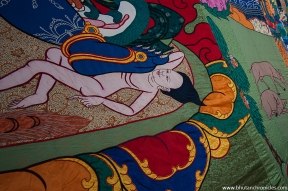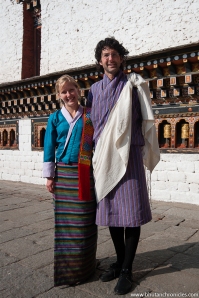“Stop running. Happiness has been chasing you all this time…”
Moving to Bhutan does funny things for one’s happiness. Increasingly famous for developing the concept of Gross National Happiness, Bhutan is the first country many people think of when asked to name the happiest place on earth. This has even led the Tourism Council of Bhutan to adopt the slogan, “Happiness is a Place”. Happiness is much more than a place, but indeed, Bhutan has been a great place for me to learn about my own happiness.
People often ask me if I am happier here, and whether those around me are truly the happiest people in the world. The answers to such questions are at first complicated, and eventually simple. People here are not in a race to be happier or happiest. I was amazed to learn recently that the happiness of an individual is 50% genetic, 40% attitude, and only 10% based on one’s environment and conditions. So why would Bhutan make me happy?
One of the most interesting experiences with happiness in Bhutan is the presence of meditation and mindfulness. The idea of “be here now” is very present, and even schools practice meditation exercises for a few minutes every day. The book “Engineering Happiness” (reviewed here) dictates that Happiness equals Reality minus Expectations. Despite being a poor country with its own development challenges, the people have smiles on their faces and seem genuinely happy.
My experience here has led me to come up with my own four rules for happiness:
Let stuff go: Antonia, and I came to Bhutan with only a few pieces of luggage, forced to whittle down our belongings to what we thought we would need for a year or two. Having run a project on sustainable consumption, I was acutely aware of the inverse correlation between the accumulation of stuff and happiness, and I was eager to explore this in practice. My suitcases were filled with mostly with clothes I would be happy to leave behind, plus a large quota of equipment for hiking, camping, cycling and photography. We sold our car and left behind a lot of suits and an attic full of stuff. I still haven’t let go completely and did buy a secondhand iPhone on a recent trip abroad, but I am confident that I will be better at getting rid of quite a bit when I return.
Money is minor: Most people would acknowledge that, beyond basic human needs, money does not buy happiness. Only by moving to Bhutan have I been able to test out this theory in my daily life. With a household income that is about 95% less than a year ago, we have had to make a few adjustments. We keep a careful budget to account for where every Ngultrum goes. Things like cashews are a luxury, and any item over $5 requires consultation. We have ended some months with less than a dollar in the bank, but still happy. Again, our situation is special, because we do have savings to provide a safety net. With the living allowance received, we are still able to live in Upper Motithang, considered the ‘Beverly hills’ of Thimphu, and we certainly have all the comforts we would want. I would hate to think that my happiness relates to the Jonses (or Dorjis here), but we certainly appreciate that we have a good standard of living when compared to some neighbours with no running water.
Less is more: One big contributor to my happiness here is simply doing less. If asked before coming what I would do to be happy, I would have listed many things I would do more of: travel, sports, yoga, cooking, family time, etc. Like most other people, I would have completely forgotten that in order to do more of one thing, one must do less of something else. I am now conscious that I am leading a fuller and more balanced life by working much less than before, including more of everything I would have liked. This is largely the result of the working environment here, which is very much based on a 35-hour work week rather than my previous standard of 55-60 hours. By moving to Bhutan, I managed to force myself into a “reset” mode that would not have been possible in Europe.
Flexibility is freedom: While I am working less, I don’t consider myself to have become lazy all of the sudden. In fact, it is quite the opposite. Here in Bhutan I have discovered a new professional ambition and motivation delivered by independence and freedom. My CEO generally responds to my proposals with a bit of incredulity, followed by “If you think you can make it happen…” Another part of doing less has allowed me to accept various advisory roles on projects and committees that I simply find interesting. The happiness brought by this new freedom makes me realize how stifled I felt by strict organizational structures. With a carte blanche, I now can be more creative and strategic in my work.
Recently, I was speaking with a friend about how my life has changed since being in Bhutan. I highlighted a number of the points I mentioned above, and in particular how much happier I feel now, compared to before. They then challenged me not to be happier, but just to be happy. After all, what is happier? Happier than what? My own self?
Coming from a competitive environment where superlatives are the norm, I find myself suddenly absorbed by this difference between driving myself to be happier and just accepting happiness. I won’t necessarily be going into a meditative retreat as the monks here do for three years, three months and three days, but I certainly will be more mindful of my happiness, and seek to accept it in the time and place I find it.


Reblogged this on The Daily Advocate By Painspeaks.
Pingback: Randall Krantz on Finding Happiness : Sustainable Play·
Thanks! I am about to be relocating to Bhutan for a few years. Your article really gave me another side of the move that others have missed. Happy Daze!!!
Knicci, Thanks for the comment. Please do come, it is definitely an adventure you won’t regret. Let us know when and where you might show up!
I have been planning on leaving the us for some time and Bhutan is my 1st choice i am not sure tho how much currency id need to save to start a life there. If anyone can give any advice on how much usd it would cost to purchase a small home and comfortable life in bhutan I’d greatly appreciate it. 🙂
Bhutan would be a great place to retire or just hide out for a few years! Unfortunately, their immigration policies are quite strict, and a visa is either very difficult or very expensive to get! That also means that foreigners cannot own property. If you are interested in volunteering, there are options for teaching, hospital work and potentially several internships with the UN or even the Government. Good luck!